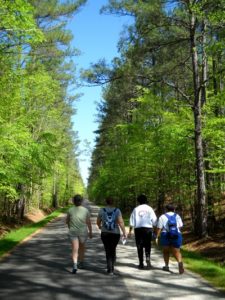I love a good trail, and while I’m familiar with a lot of traditional hiking trails in North Carolina (see “Backpacking North Carolina” and “100 Classic Hikes in North Carolina”) I’m less familiar with the state’s rails-to-trail’s projects. I realized this in December when, on a 50-mile backpack trip of the North Carolina Bartram Trail, I suddenly found myself on a 1.2-mile stretch of paved greenway along the Nantahala River. Later, I learned that I’d been on the Nantahala Bikeway, a U.S. Forest Service project that incorporates a half mile of old railbed along the Nantahala River in Swain County (near Patton’s Run, for you whitewater boaters).
I learned this by noodling around on the North Carolina Rail-Trails Web site, where I discovered the Nantahala Bikeway is not alone. In fact, there are 30 rails-to-trails projects in North Carolina encompassing 130 miles of trail. You’ve probably heard of one or two. In the Triangle, for instance, nearly everyone knows the American Tobacco Trail, a 22-mile, nearly complete trail that runs from western Wake County into downtown Durham. In the mountains, there’s the popular Thermal Belt Rail-Trail, which runs 8 miles from Spindale to Gilkey in Rutherford County, and the 4.5-mile Little Tennessee River Greenway in Macon County. At the coast, folks may have spent some time on the 5.5-mile Jacksonville-Camp LeJeune Rail-to-Trails in Onslow County.
What hampers the visibility of rails-to-trails projects in North Carolina is the absence of true superstars: Virginia’s 57-mile New River Trail and the 34-mile Virginia Creeper Trail; the 184.5-mile Chesapeake & Ohio Canal National Historic Park trail in D.C. and Maryland; or the granddaddy, the 237-mile Katy Trail, which spans most of Missouri. We have no superstars in large part because, unlike in the north and Midwest where railroad companies have been willing to abandon long stretches of line, the obvious prerequisite for a rails-to-trail conversion, rail companies here retain hope that even their abandoned lines may once again become economically viable. And so, we have 30 projects across the state that have capitalized on smaller abandonments, from the 22-mile American Tobacco Trail to the half-mile Lansing Trail in Ashe County.
